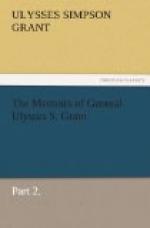One amusing circumstance occurred while we were lying at anchor in Panama Bay. In the regiment there was a Lieutenant Slaughter who was very liable to sea-sickness. It almost made him sick to see the wave of a table-cloth when the servants were spreading it. Soon after his graduation, Slaughter was ordered to California and took passage by a sailing vessel going around Cape Horn. The vessel was seven months making the voyage, and Slaughter was sick every moment of the time, never more so than while lying at anchor after reaching his place of destination. On landing in California he found orders which had come by the Isthmus, notifying him of a mistake in his assignment; he should have been ordered to the northern lakes. He started back by the Isthmus route and was sick all the way. But when he arrived at the East he was again ordered to California, this time definitely, and at this date was making his third trip. He was as sick as ever, and had been so for more than a month while lying at anchor in the bay. I remember him well, seated with his elbows on the table in front of him, his chin between his hands, and looking the picture of despair. At last he broke out, “I wish I had taken my father’s advice; he wanted me to go into the navy; if I had done so, I should not have had to go to sea so much.” Poor Slaughter! it was his last sea voyage. He was killed by Indians in Oregon.
By the last of August the cholera had so abated that it was deemed safe to start. The disease did not break out again on the way to California, and we reached San Francisco early in September.
CHAPTER XV.
San Francisco—early California experiences—life on the Pacific coast —promoted captain—Flush times in California.
San Francisco at that day was a lively place. Gold, or placer digging as it was called, was at its height. Steamers plied daily between San Francisco and both Stockton and Sacramento. Passengers and gold from the southern mines came by the Stockton boat; from the northern mines by Sacramento. In the evening when these boats arrived, Long Wharf—there was but one wharf in San Francisco in 1852—was alive with people crowding to meet the miners as they came down to sell their “dust” and to “have a time.” Of these some were runners for hotels, boarding houses or restaurants; others belonged to a class of impecunious adventurers, of good manners and good presence, who were ever on the alert to make the acquaintance of people with some ready means, in the hope of being asked to take a meal at a restaurant. Many were young men of good family, good education and gentlemanly instincts. Their parents had been able to support them during their minority, and to give them good educations, but not to maintain them afterwards. From 1849




